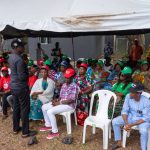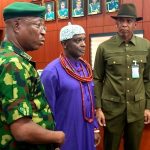PRINTING MONEY: CBN, FAAC AND OBASEKI’S ‘’MISINFORMATION’’, BY ARIZE NWOBU
MAY 21, 2021
Printing money in an idealized world is different from printing money in the financialized banking economy. When economists talk about money printing, they are rarely talking about printing physical currency. In modern financialized banking economy, printing of money is just an asset swap and portfolio shift.’
The power of information and communication in nation building and driving financial markets and economy is immense. Accurate information and proper communication creates a proper value perception and builds public confidence. Proper and timely communication aims at informing, instructing and inspiring people, and is a strategic tool for driving economic growth and speedy transformation of a country. It also helps to nip crisis in the bud.

Contrariwise, information opacity, fake news, disinformation and misinformation cast darkness and shadows on a situation and fertilize crisis. Even the Bible noted it. The Good Book says that ‘’the tongue is a fire…’’ which means that words can ignite a crisis. That is why it is important especially for leaders to be well informed and circumspect when they speak. False and improper communication can trigger negative perceptions and discourage investments. In the extreme, it can trigger riots, wanton destructions and deaths.
Recently, the Governor of Edo State, Mr. Godwin Obaseki committed a ‘’faux pas’’. He ‘’misinformed’’ the nation when he raised an alarm that the Federal Government through the Central Bank of Nigeria (CBN) printed N50-N60 billion for the month of March to augment revenues shared by the federating units.
Reportedly, Obaseki said: ‘’when we got the Federal Allocations for March, the Federal Government printed additional N50- N60 billion to top-up for us to share. This April, we will go to Abuja and share. By the end of this year, our national borrowing is going to be within N15-n16 trillion. Imagine a family that is just borrowing without any means to pay pack, and nobody is looking at that, everybody is looking at 2023.’’
Two things are involved. One, is the ‘’falsehood’’ in Obaseki’s proclamation. And two, the need for a proper understanding of the concept of printing money. Apparently piqued, and may be disappointed, CBN Governor, Godwin Emefiele described Obaseki’s claim as ‘’unfortunate and inappropriate’’.
The Edo State Governor is a high profile stock broker and investment banker. He is suave, sophisticated, dignified and vastly experienced in financial market dynamics. He has also proven to be a tough cookie politically. With such a lofty pedigree, Emefiele most probably expected him to be more informed and have a better understanding of the issue. But alas, not so, which could be the reason Emefiele noted that Obaseki’s claim was ‘’unfortunate and inappropriate.’’
The Minister of Finance, Budget and National Planning, Mrs Zainab Ahmed also debunked Obaseki’s claim. She noted that the monies distributed at the Federal Allocations Committee (FAAC) were generated from the Nigeria Customs Service, the Nigerian National Petroleum Corporation (NNPC) and the Federal Inland Revenue Services (FIRS). It was therefore a double whammy for Obaseki whose ‘’misinformation’’ must have aroused and worsened public sentiment.
The reality is that economies go through cycles and tough times and Nigeria is not an exception. America faced the biggest recession in the 1930s with the economy on the brink of collapse. It went through another rough cycle in 2008-09. There is no doubt that the Nigerian economy has also been facing challenges. But the important thing is that great efforts are being made especially by CBN to reposition the economy. Rather than raising ‘’false alarms’’, it demands that all hands should be on deck for the greater benefit of the economy.
The economy barely emerged from recession in 2017 and had started gathering momentum with a fragile growth before the Covid-19 pandemic hit and destabilized the global economy.
In response, central banks across the world evolved a barrage of stimulus packages and unconventional methods including ‘’helicopter money drop’’/printing money, quantitative easing and other methods to support their governments and citizens.
‘’Helicopter money drop’’ is a concept coined by the great monetary economist, Milton Friedman. It involves printing and distributing money by central banks to governments and public to fulfill basic needs. It aims at helping or lifting an economy out of recession or to prevent recession. It has its own pros and cons.
United Kingdom printed about £200 billion in response to the pandemic. The Fed under former President Trump used a combination of helicopter money drop and quantitative easing to support the government and citizens. It printed about $3 trillion to support the government.
CBN was proactive and evolved numerous stimulus packages across sectors with time lines ranging from the immediate to short-term and medium-term priorities, developments which demand that all hands should be on deck rather than raise false alarms.
For clarity, and with particular reference to Obaseki’s ‘’false claim’’ on printing money, it is important to have a proper understanding of the concept of printing money which has been widely misunderstood and politicized.
Steve Roth, Chairman of Vornado Realty Trust- the ‘’largest commercial land lord in New York who owns more than 20 million square feet of Manhattan office rental spaces’’ noted as follows: ‘’printing money, you hear it all the time in economic discussions- from economists, reporters, everyday news consumers, and from politicians across the spectrum. For some participants, it is the most bitter invective you can hurl.’’
According to Roth, ‘’printing money in an idealized world is different from printing money in the financialized banking economy. When economists talk about money printing, they are rarely talking about printing physical currency. In modern financialized banking economy, printing of money is just an asset swap and portfolio shift.’
Many people must have misunderstood Obaseki’s ‘’ false claim and misinformation’’ to mean printing of physical currency. But the bottom line is that both the Finance Minister and CBN Governor categorically debunked Obaseki’s claim. For the CBN Governor, the claim was ‘’unfortunate and inappropriate.’’
Nwobu is a Business Journalist. He wrote via arizenwobu@yahoo.com. Tel: 08033021230.







